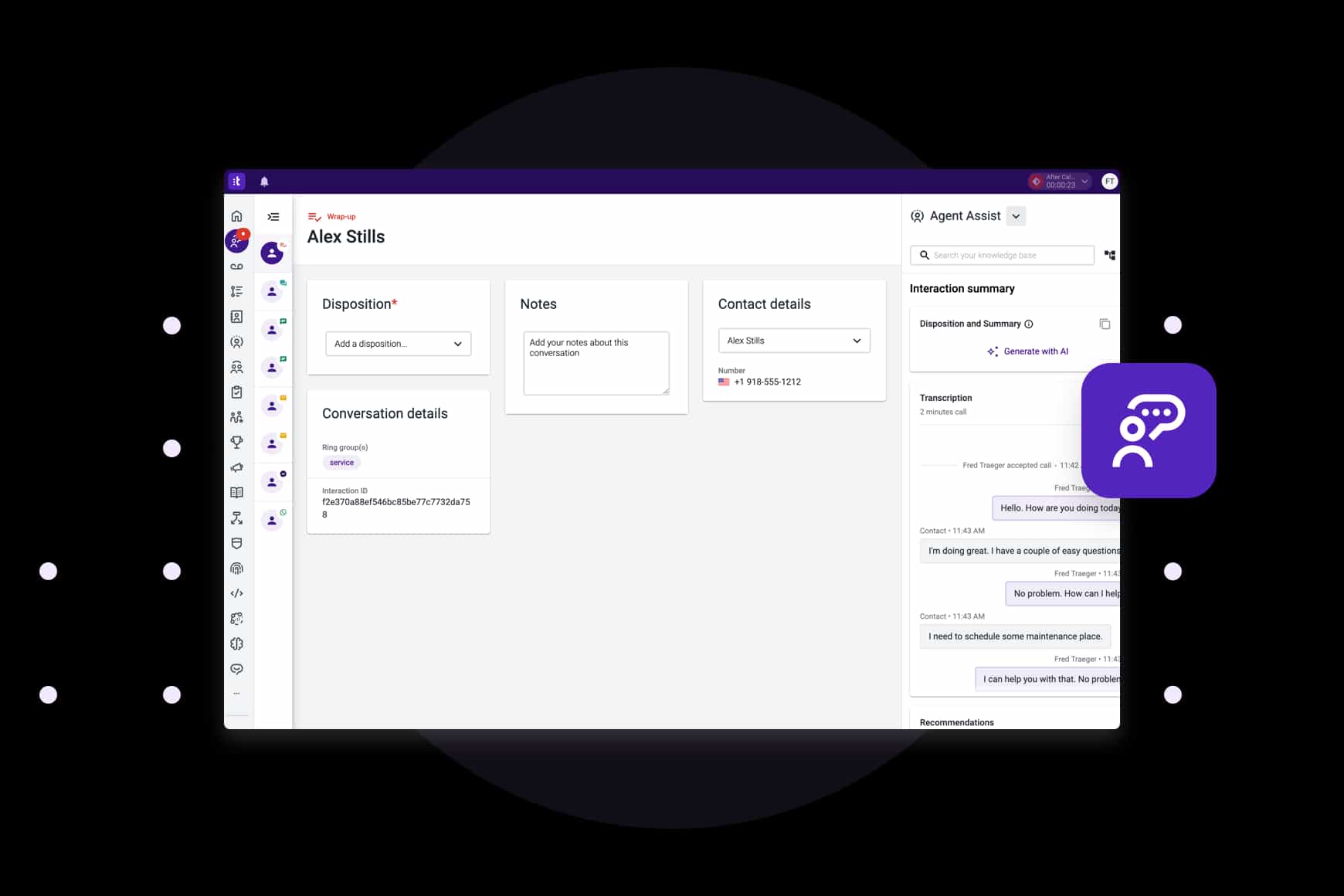14 consejos para un servicio de atención al cliente excepcional en el centro de llamadas

Por Celia Cerdeira
0 min de lectura

Las expectativas del servicio de atención al cliente han aumentado significativamente en los últimos años. Según un estudio reciente de Salesforce, el 88 % de los clientes encuestados afirma que la experiencia con el servicio de atención al cliente es tan importante como los productos o servicios a la hora de tomar una decisión de compra, frente al 80 % en 2020. Y casi todos los encuestados (94 %) afirmaron que una experiencia positiva con el servicio de atención al cliente hace que sea más probable que vuelvan a comprar un producto.
Hoy en día, brindar una experiencia del cliente excepcional ya no es algo opcional, es una necesidad.
Para mejorar el rendimiento de su centro de contacto, es esencial capacitar y desarrollar agentes informados, empáticos y eficientes para el servicio de atención al cliente. Los siguientes consejos para el servicio de atención al cliente en los centros de contacto pueden ayudar a reforzar la capacitación existente o servir de base para un sólido programa de capacitación que ayude a sus agentes a abordar con confianza las inquietudes de los clientes, proporcionar información precisa y brindar una experiencia del cliente personalizada.
14 consejos para el servicio de atención al cliente en los centros de contacto.
Los siguientes consejos para el servicio de atención al cliente están profundamente arraigados en los principios de la comunicación eficaz, la empatía y la resolución de problemas, y pueden mejorar drásticamente sus interacciones con los clientes.
1. Interactúe con una escucha activa.
La escucha activa permite comprender mejor las necesidades de los clientes y muestra la disposición del agente para ayudar. Para escuchar activamente, permita que el cliente hable sin interrupciones, haga eco de su pregunta o inquietud principal y realice preguntas aclaratorias si es necesario.
2. Hacer énfasis en la comprensión.
Asegúrese de que cada cliente sea consciente de que usted comprende sus necesidades. Al repetir las preocupaciones de cada cliente y hacerle las preguntas pertinentes, los agentes del servicio de atención al cliente pueden transmitir que entienden a los clientes y que están haciendo un esfuerzo para ayudarles a resolver sus problemas.
3. Sea cortés.
Sea educado y respete a sus clientes. Utilice siempre "por favor" y "gracias" para crear un entorno acogedor en el centro de contacto y establecer relaciones positivas con los clientes. Deje que su cliente termine de hablar antes de empezar a hablar usted y mantenga siempre un tono de voz profesional y tranquilo.
4. Llame al cliente por su nombre.
Pregunte al cliente su nombre y pronúncielo correctamente. Esto transmite respeto por el cliente y les hace saber que son importantes.
5. Haga un esfuerzo adicional.
Demuestre con hechos que el cliente es importante realizando un esfuerzo superior al mínimo exigido. Esto podría ser algo tan sencillo como revisar sus notas de llamadas anteriores para poder hablar con autoridad sobre su consulta.
Si usted tiene acceso a todos sus productos y servicios, realice una revisión rápida para asegurarse de que su cliente tiene todo lo que necesita, además de una resolución a su consulta. ¿Hay alguna manera de ahorrarles dinero agrupando sus servicios? Al tomar la iniciativa de brindar un mejor servicio o darle algo extra al cliente, estos se sentirán valorados y apreciados.
6. Haga preguntas abiertas.
En lugar de limitarse a repetir las afirmaciones de su cliente, haga preguntas que animen al cliente a dar más información con sus propias palabras. Por ejemplo, si el cliente menciona una comisión, no se limite a repetir lo que dice: "Así que está llamando por una comisión". En su lugar, haga una pregunta abierta: "Veo que está llamando por una comisión en su cuenta. ¿Le importaría contarme un poco más para poder ayudarle? Hacer las preguntas adecuadas hace que la conversación sea más colaborativa y se llegue a la raíz del problema.
7. Capacite a los clientes con la información correcta.
Dar a los clientes toda la información que necesitan les capacita para tomar decisiones informadas. Cuando haya opciones, describa minuciosamente cada alternativa disponible. Esto les ayudará a involucrarse más en la resolución de sus problemas y dará lugar a una mayor satisfacción del cliente.
También querrá asegurarse de ofrecer respuestas precisas a las consultas de los clientes, para que puedan resolver sus consultas más rápidamente. Mediante el uso de una herramienta de gestión del conocimiento impulsada por IA, los agentes pueden obtener respuestas completas a las consultas de los clientes con solo una búsqueda rápida.
¿Está interesado en obtener más información?
Póngase en contacto con nuestro equipo para ver cómo Talkdesk puede mejorar el nivel de sus soluciones de Software para Centros de Contacto.
8. Explique sus procedimientos.
Los clientes no siempre están familiarizados con las políticas o procedimientos de su empresa. Explique minuciosamente a los clientes lo que está haciendo y por qué lo está haciendo. Una comprensión clara tiende a disminuir la frustración del cliente.
9. Utilice un lenguaje sencillo.
Evite los términos técnicos, la jerga y las siglas. Sea profesional, conciso y claro.
10. Recurra al supervisor cuando sea necesario.
Cuando las necesidades del cliente estén más allá de su experiencia o nivel de competencia, remítalo a un colega, a un supervisor o a un gestor. Explíquele siempre al cliente que será transferido a alguien que podrá abordar su problema de forma efectiva.
11. Sea empático, pero con profesionalidad.
Sea consciente de la forma en que su cliente está hablando. Aunque puede ser difícil escuchar a un cliente enojado o molesto, es importante mantener la profesionalidad. Aborde la conversación desde una actitud empática, sin prometer demasiado. Haga que su cliente se sienta escuchado y enfóquese en las soluciones más que en el problema. De esta manera, su cliente se siente comprendido y sabe que usted está trabajando para encontrar una solución que beneficie a ambos.
8. Sea proactivo.
Su objetivo principal es resolver su problema inmediato, ¡pero no se detenga ahí! Encuentre formas de mejorar proactivamente todos los aspectos de la experiencia de sus clientes mientras los tiene delante.
Una excelente manera de hacerlo es asegurarse de que los datos personales de su cliente están actualizados. Confirme que todavía tiene su número de teléfono, dirección y email correctos. Además, si ha pasado algún tiempo desde la última interacción de su cliente, ¿por qué no ver si sus servicios y productos siguen siendo los más adecuados para su situación actual? Un check-in proactivo con su cliente podría ser la diferencia entre una puntuación NPS neutra y un 9 o un 10.
13. Personalice sus recomendaciones.
Ofrecer recomendaciones personalizadas puede ayudar a un cliente a resolver su consulta más rápidamente y aumentar su satisfacción. Explíquele por qué está haciendo la sugerencia basándose en lo que ha descubierto en su conversación y en un escaneo del registro de contacto de su cliente. Las herramientas de inteligencia artificial (IA), como los agentes virtuales y las bases de conocimientos, también pueden ayudarle a ser proactivo y eficiente al generar sugerencias automatizadas sobre soluciones a las consultas.
14. Tome notas detalladas de las llamadas y cree un resumen posterior a la llamada.
Tomar notas detalladas de las llamadas y proporcionar un resumen después de la llamada es esencial para un excelente servicio de atención al cliente en el centro de contacto. Puede ser difícil, ya que los agentes suelen tener que pasar rápidamente a la siguiente llamada y aumentar su tasa de rapidez de respuesta. Sin embargo, es importante dar un paso adicional para resumir la interacción con precisión en las notas de llamadas del cliente para que los agentes puedan ahorrarle al cliente cualquier frustración si vuelven a llamar por el mismo problema.
Ya no es necesario realizar este proceso manualmente. Las herramientas impulsadas por IA, como el resumen automático de Talkdesk, utilizan el mismo LLM que impulsa ChatGPT para crear al instante resúmenes posteriores a la llamada, reduciendo la carga de trabajo después de la llamada de los agentes.

Interactive demo
Vea en acción el Resumen Automático Impulsado por GPT de Talkdesk Agent Assist.
Esta demostración autoguiada le permitirá experimentar cómo los agentes, utilizando la misma IA generativa que impulsa ChatGPT, pueden aumentar la eficiencia al resumir automáticamente cada interacción con el cliente, reduciendo de 30 a 60 segundos el trabajo después de la llamada con solo un clic.
Puntos clave para brindar un servicio de atención al cliente excepcional en el centro de contacto.
Para mejorar el servicio de atención al cliente del centro de contacto, es crucial adoptar las siguientes medidas:
- Potencia a tu equipo. Invertir en el desarrollo profesional del equipo de su centro de contacto para dotarles de habilidades efectivas de comunicación, empatía y resolución de problemas.
- Implementar técnicas prácticas. Utilice estrategias como escuchar activamente, demostrar comprensión y mantener una comunicación cortés.
- Sea proactivo y claro. Interactúe de forma proactiva para satisfacer las necesidades de los clientes, aproveche herramientas avanzadas como la IA para mejorar la eficiencia y proporcione información clara y honesta sobre productos o servicios para mejorar la experiencia del cliente.
Siga estos puntos clave para mejorar el servicio de atención al cliente de su centro de contacto y brindar experiencias excepcionales a sus clientes.
Talkdesk impulsa resultados empresariales excepcionales con un software de centro de contacto en la nube impulsado por IA creado para su sector que es fiable, flexible e innovador. Solicite una demostración hoy mismo para ver cómo Talkdesk potencia el servicio de atención al cliente moderno y a medida.
Preguntas frecuentes sobre el servicio de atención al cliente para centros de contacto.
¿Qué hace que el servicio de atención al cliente en los centros de contacto sea excelente?
Un excelente servicio de atención al cliente en un centro de contacto puede resumirse en varios factores clave: coherencia, rapidez, amabilidad, capacidad de respuesta y competencia. Cuando todas estas categorías se ejecutan bien, usted puede garantizar una excelente experiencia del cliente en todo momento.
¿Cuáles son las principales ventajas de un servicio de atención al cliente excepcional en los centros de contacto?
Un servicio de atención al cliente excepcional en los centros de contacto ofrece numerosas ventajas que contribuyen directamente a su éxito. Estas incluyen:
- Retención y fidelización de clientes. Un servicio de atención al cliente excepcional es vital para retener a los clientes existentes. Cuando los clientes reciben experiencias positivas y soluciones eficientes a sus problemas, es más probable que permanezcan fidelizados a la empresa.
- Ventaja competitiva. Las empresas que priorizan la prestación de un servicio excepcional se destacan de sus competidores, obteniendo una ventaja competitiva y atrayendo a más clientes.
- Oportunidades de ventas cruzadas y adicionales. Un equipo de servicio de atención al cliente bien capacitado puede identificar oportunidades para aumentar las ventas o realizar ventas cruzadas de productos o servicios adicionales a los clientes. Comprender las necesidades de los clientes y proporcionar recomendaciones relevantes permite a los agentes del centro de contacto aumentar los ingresos y el valor del ciclo de vida del cliente.
- Feedback e información de los clientes: Las interacciones con el servicio de atención al cliente proporcionan un valioso feedback e información sobre las preferencias de los clientes, los puntos débiles y las áreas de mejora. Esta información se puede utilizar para mejorar los productos, los servicios y la experiencia del cliente en general, que conducen al crecimiento y la innovación continuos.
- Gestión de crisis: En tiempos de crisis o eventos imprevistos, el servicio de atención al cliente se vuelve aún más crucial. Un centro de contacto bien preparado puede gestionar el aumento de las consultas de los clientes, brindar tranquilidad y abordar rápidamente las inquietudes, ayudando a mantener la confianza y la fidelización de los clientes.
¿Cómo puede ayudar Talkdesk a mejorar el rendimiento de su centro de contacto?
Talkdesk es un líder mundial de centros de contacto en la nube para empresas de todas las dimensiones. Talkdesk CX Cloud e Industry Experience Clouds ayudan a las empresas a brindar un servicio de atención al cliente moderno y a medida. Nuestro software de centro de contacto confiable, flexible e innovador aprovecha la IA y la automatización para generar resultados excepcionales para sus clientes y mejorar la cuenta de resultados.
¿Le ha resultado útil esta información?
Obtenga aún más información sobre cómo Talkdesk puede aumentar la calidad de sus experiencias del cliente.






